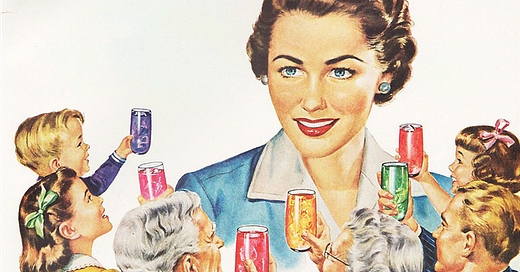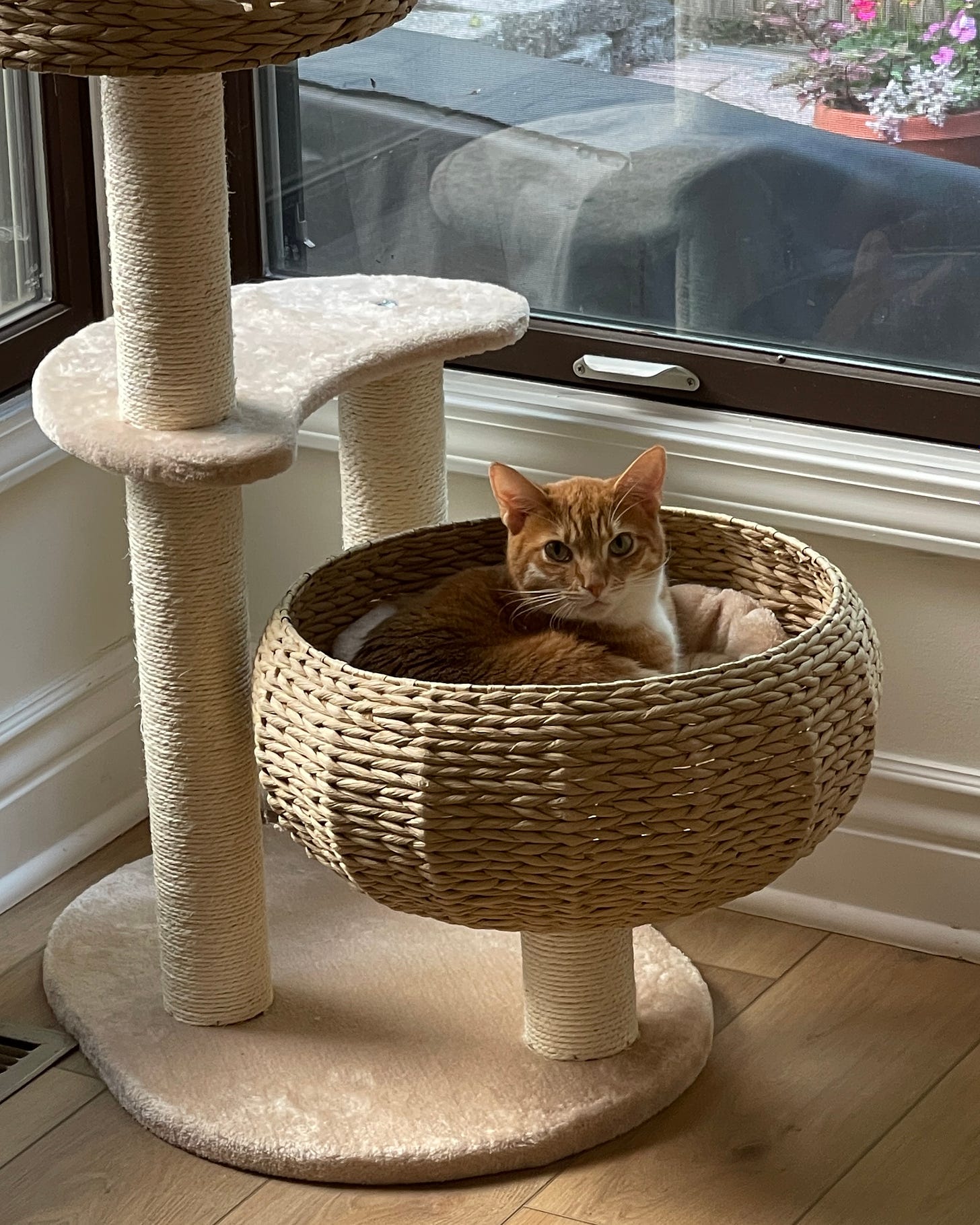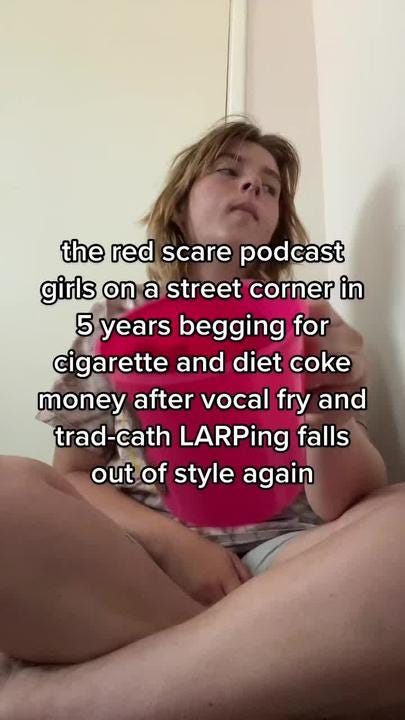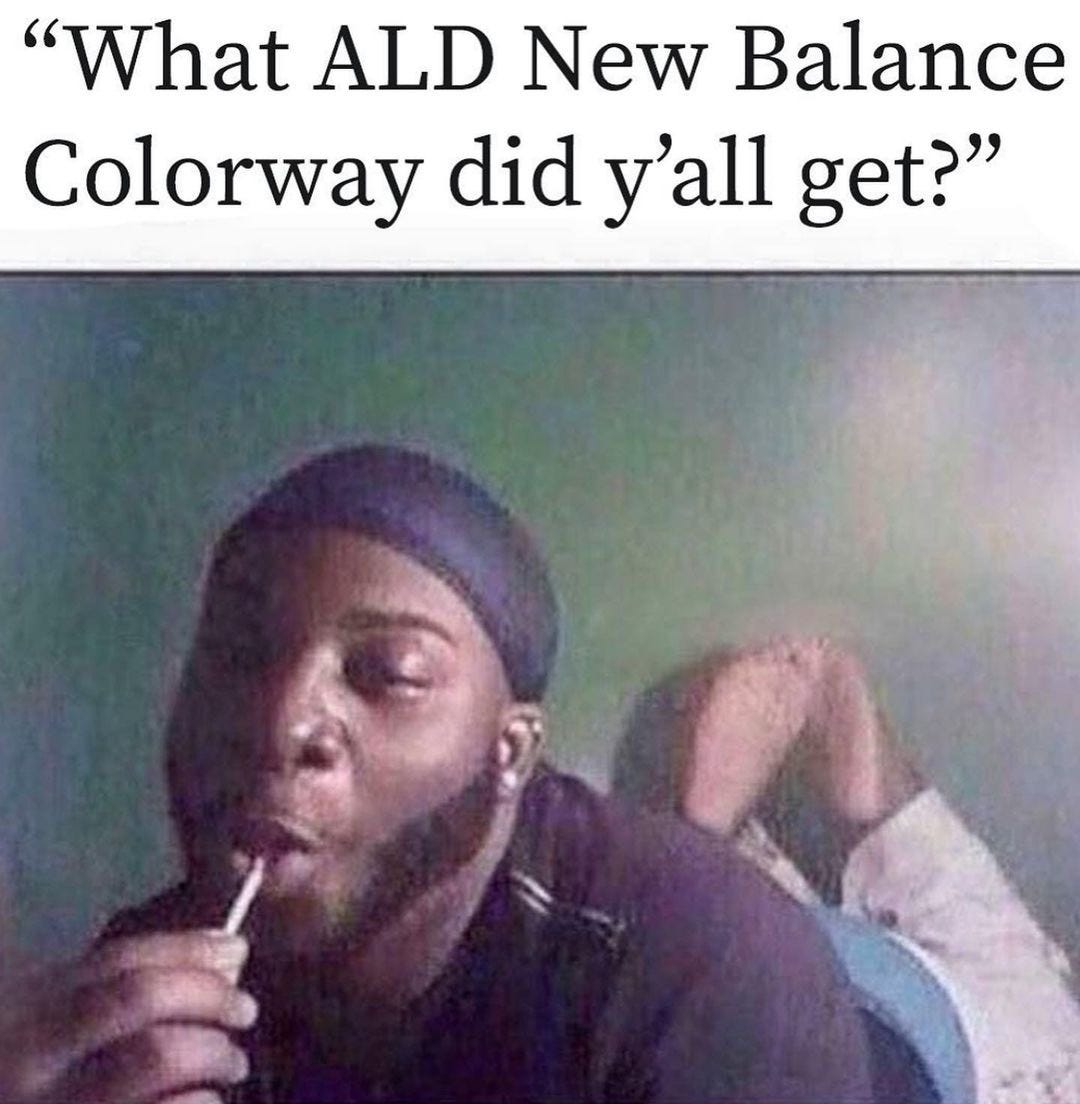Welcome to the third and final installment of Alex & Dia Drink the Kool-Aid: a series exploring the different cultural pillars we’ve indulged, and how they’ve impacted our identities. We assign each a toxicity rating on a scale of 1-10—think of 1 as trying the Ice Spice × Dunkin’ Donuts drink collab, and 10 being FaceTune.
If you’re new to this series, read part one & part two. Subscribe to get future essays sent directly to your inbox:
Home Ownership
Toxicity Rating: 3/10 (Alex)
When I was a kid, I assumed two things were a given: as a grown-up, I’d have a job and a house. For millennials raised in middle-class families, we learned neither of these things were guaranteed as we got older. Yet we were still encouraged to work as hard as we could to get them.
This past spring, my wife and I bought a condo after years of apartment living and grinding it out at our corporate jobs. Now, we have the lauded title of home owners. Every conversation someone has with us includes, “How’s the house?” And every time, we hesitate to answer, squeaking out a small laugh as we glance at one another. It’s not that we don’t like our condo or that we’re not thankful to have a house; we just know it’s not where we want it yet and don’t know when it will be there.
“The pandemic made existing space feel insufficient,” wrote
in a recent Substack post, How Your House Makes You Miserable. Petersen continued, “There was a lot of time to contemplate everything that was wrong about your space, and very little encouragement to think about everything that was right.” While we didn’t live in our condo through the heights of the pandemic, it changed how we view our home and what we deem as necessary to feel at home in our home. We also got our cat during the pandemic, so that changed a lot for us too.I don’t know enough about finances to know whether home ownership is a good investment, but we do have a space for a cat tree now—and that feels like money well spent.
Red Scare Podcast
Toxicity Rating: 7/10 (Dia)
When 2020 splintered the left with infographic wars and therapy speak, many were thirsty for new perspectives—voices that subverted the establishment majority and called out covert narcissism. Who knew it’d come in the form of cig-smoked vocal fry, two grown women using the r-word, shooting guns with Alex Jones? To say Anna and Dasha started a movement is an understatement. A tsunami of mostly women and gay men started living off sardines and Camille Paglia, straddling the lines of classical liberalism and new school conservatism.
Anna and Dasha think abortion is bad. Anna and Dasha think a size 6 is fat. And at least Anna thinks Kyle Rittenhouse was innocent. I’m clearly cherry-picking here, but Red Scare is a strange, strange world. It didn’t matter whether I agreed with them or not because at the end of the day, they represented things I crave: diversity of thought, irreverent humor.
Red Scare entered my life at a point of sociopolitical apathy. This is a big deal considering my history of caring a lot. I paid my DSA dues. Protested. Had a six-year career fighting for education for Philly’s poorest kids. But when, for example, a “friend” tries to cancel you for “not doing enough” on fucking Instagram for Palestine (despite having shared educational resources! and places to donate! lol!), it is DIZZYING. We were living in batshit times. And I was drawn to Red Scare because I was spiraling amidst the manufactured divisiveness and needed a good, maniacal laugh.
I don’t regret my stint as a Red Scare Girl. It helped me see through the moralistic liberal veneer (Alex does a great job addressing this in the second installment of this series). But I’m in a different place now. I don’t think I’ve listened to the podcast once this year. It’s not that I’m against it or anything; I think Anna and Dasha are probably good-hearted people who play the edgelord card because it makes them a lot of money. I just personally don’t want to consume content that obscures my values and makes me callous. Moral of the story: it’s ok to vomit up your black pill.
Hypebeast Culture
Toxicity Rating: 5.5/10 (Alex & Dia)
Dia: From 22-25, I dated a guy with wild style. Very X Games Colorado stoner bro meets Brooklyn meets landscaper if you can even remotely imagine that disaster in action. He was cool in the purest sense: rocked a mustache before it was trendy, clashed patterns with a striped LRG tee, a Hawaiian floral five panel, some crazy Nike SB Janoskis. I was classically girly and small-townish in Old Navy cardigans by day, bodycon Forever 21 dresses by night.
There’s this White Stripes song, “I’m Slowly Turning Into You” that I hold dear, in part because that’s what happened with this ex. His style became my style. He bought me my first pair of Air Max 90s and I felt like the coolest girl in the world. It was then that my brain started orienting toward streetwear—comfortable, androgynous pieces that could elevate a look into something more chic and urban.
We broke up and I moved to Philly and here, my eyes really opened. Philly is a line around the block for the newest Jordans at UBIQ (sorry, Atmos). Philly is All Caps Studio. Philly is a kitchen sink of art and culture and you might leave your house begrudgingly JUST to get a fit off. And for a long time, I loved that shit. Sharing my outfits on IG, feeling like I belonged to a warm and porous scene of people who really used fashion as a tool for self-expression. I even modeled for a couple local streetwear brands. Philly hypes you up like that.
But beyond thrift store come-ups and StockX bids, hype culture had altered my life in other ways, too. Ways less visible but ultimately, more damaging. I loved curation. I was gripped by the normcore, “old money” aesthetic of brands like Aime Leon Dore and Emily Oberg’s Sporty & Rich. This “less but better” philosophy of dressing taught me that quiet luxury was king, and the playfulness I’d felt toward fashion grew increasingly austere.
Coveting a certain lifestyle promised by a brand can make you feel weak. Who was I as a person if things could influence me so much? Hype promotes a kind of “aesthetic as identity” vibe that doesn’t serve me anymore. I still love fashion. I’m still susceptible to trends (hello, Sambas). But I’ve largely detached from the culture at large.
As of August, I’m trying to go a full year without purchasing any clothes, shoes, accessories, etc. (unless it’s absolutely necessary, e.g., my winter coat rips, or for running). Will she make it? Check back in 11 months.
Alex: “You’re going to regret doing that,” my girlfriend at the time (now wife) said while taking a fit pic of me and my homie. It wasn’t the fit pic I would regret (because you should absolutely get flicked up with the homies) but how I had styled my outfit. I was wearing a longline tee and a bomber jacket—both à la Kanye West. But to make it look like I had buttoned the top button of the jacket, I clasped the zipper at the top.
I played with my fashion and tested what looked cool in the name of streetwear. Coming into college, I didn’t know what streetwear was. I went to a predominantly white southern high school and stayed in the South for college. The guys around me wore salmon-colored shorts and Sperries, so I wore salmon-colored shorts and Sperries.
I’d say I didn’t like standing out, but the friends who saw me on campus with neon yellow basketball shorts and matching highlighter shoes would say otherwise. Transitioning from high school into college, my identity was so jumbled up—and my fashion reflected that. During junior year, I discovered thrifting and sneaker boots, found my way back to skinny jeans, and fell in love with Kanye as a fashion icon more than just one of my favorite rappers.
As my fashion changed, my worldview changed. I started an Instagram and Tumblr blog where I curated images at the intersection of hip-hop, art, and fashion. I would talk ad nauseam about chasing my dreams and “listening to the kids.” My homies and I even got to help do some styling for different on-campus events.
While I think I’ve come a long way since then, I still get antsy about not having a certain piece of clothing or pair of sneakers in my closet—most recently with camo jeans and Salomons. It’s even more magnified now that I work at a fashion retailer because I can get most of the items I feel are missing from my wardrobe but it’s uncool if I’m only wearing that one brand. I have to mix in at least one item not from work.
I don’t have enough energy to be first in line for the hype train, but I still enjoy riding. I do regret my outfit in that picture now, though. And unfortunately, I’m still susceptible to the zeitgeist. But at least I don’t listen to Kanye anymore. A win’s a win.
Marriage
Toxicity Rating: 1/10 (Alex & Dia)
Alex: I know marriage is antiquated and heteronormative and contradicts much of the thinking that aligns with abolishing state institutions—and I don’t want to undermine any of these because I believe the critiques are valid and worth examining. I also understand how this makes me a walking contradiction.
That’s what a lot of drinking the Kool-Aid is. I understand neoliberalism as harmful, but I’ve voted for Democrats. The Blondes promote violent aspects of the systems we’re under, but we still listen—even if it’s done in the spirit of hate or curiosity. We’re at odds within ourselves. We look for what serves us in the things we’ve been handed.
I’m married. Last weekend, my wife and I celebrated our second wedding anniversary. Word to Chance the Rapper, I love my wife. I don’t regret getting married or having a wedding. My wife and I also didn’t need a wedding to solidify our love for one another. We used it as an opportunity to celebrate our togetherness with each other and our people. We wanted that experience, and our family and friends did too.
As a culture, I hope we can continue moving toward a place of normalizing different expressions, acknowledgements, and celebrations of love. There’s no one way or right way. A wedding isn’t the beginning of a relationship, and I hope it’s not our best day ever—but a beautiful day among many beautiful days my wife and I share with our favorite people.
“Marriage can’t simply be about living your best lives in sync,” wrote Heather Havrilesky for The Cut. “That commitment, the one that can withstand and even revel in the darkest corridors of a life, grows and evolves and eventually transcends a contract or a ceremony the way an ocean overflows and subsumes a thimble of water.”
I’m less interested in whether marriage is progressive. I’m here. I’ve made my decision. I said, “I do.” Now, how will I continue to make myself available to our needs? How will I be present to the most exciting part of being with my wife, which is all the ways we evolve as individuals and with each other?
Dia: When it came time to consider college, my mom would tell people, “Dia’s going for her MRS degree.” Do you get it? Do you get the joke? It was always my destiny to be a wife!
Now, I don’t love the way everyone’s adopted Attachment Theory as gospel, but it is a helpful framework for understanding each other. I have an anxious attachment style. This means I live in constant fear of abandonment, and have spent too much of my romantic life seeking reassurance from people who couldn’t give it to me.
Perhaps the unsung hallmark of this cursed disposition is being anxious about being anxious. You’re so ashamed of your inability to let things be, to trust that they aren’t out searching for your replacement, that you become frozen in fear of your next episode. With no shot at forward motion, it’s hard for things to last.
This is where marriage comes in.
I tried therapy, medication, meditation, journaling, deep breathing, stepping out for a run, you name it, and I still couldn’t believe someone could love me without eventually destroying me. I would go through my partners’ phones while they slept, or watch their eyes when pretty girls passed by in public (I still do this). All the stereotypical behavior that gets you labeled the “crazy girlfriend” with no compassion for what festers beneath the surface. I knew that I was broken, and I believed that the day someone proposed to me, this would all go away. All my fears of being unlovable, of getting hurt, of wasting my time, of being nothing more than a skittish partner who can’t relax into the miracle of love would surely disappear the day I became worthy of The Ring. To quote a piece I wrote in 2021 called “Dismantling My Wifey Complex”:
I tend to believe people are with me because I love them, which makes them feel good, and it couldn’t possibly be reciprocated. Thus, I’ve long fantasized about the day I get engaged when I can finally believe someone loves me back. When the tension dissolves and I no longer feel the urge to run away. Did I mention that I’ve never been dumped? I have broken up with every partner out of panicked self-preservation, scared that the longer I stay, the more susceptible I am to getting hurt. Such is the paradox of being a martyr for love with an aversion to sustained intimacy.
I got engaged in May of 2022, and, well, do I even need to say it? Of course I was wrong! Getting engaged didn’t change shit. I was still anxious. I am still anxious. Blissfully in love and excited to get married, but anxious all the same! Getting engaged showed me that these arbitrary steps we’re brainwashed into believing validate a relationship—or worse, validate a woman’s worth—they don’t function that way. And when you use them as bandaids for inner turmoil, you undermine their sacredness entirely. Which brings me to my next point…
I believe relationships are as close to God as we get on earth. I love monogamy. I absolutely stan the idea of being with one person forever. Becoming a unit. So though I know better now that it can’t fix what is fundamentally wrong with a person or a couple, I still believe in marriage with my entire chest. I come from a happily married two-parent home. My fiance’s parents have been together since they were like, 20, and they still hold hands everywhere we go, and go on cute weekend dates. I’m truly surrounded by examples of my idea of love at its best, which makes it easy to keep the faith.
We’re not having a wedding in March. But I will be his wife and he will be my husband. That’s magical to me. I’ll drink this kool-aid til death do us part.
Read Alex & Dia Drink the Kool-Aid:









I found this piece quite moving, even though I’m too old to get most of the references. I’m not sure I would have gotten them when I was young.
From my clueless perspective: it sounds like it must be confusing and anxiety-inducing to be young today. It sounds like a constant state of worrying that your generation might turn on you while you sleep, even though you’re trying to be a good person and trying to live your own life.
When I read your stuff, it sounds like you’re among the young people who don’t completely buy into all of it. Keep writing about it, I’ll keep trying to figure out what you’re getting at.
This was the best one in the series. The respect for differing opinions shines through. The honesty shines through. What a way to cap it off. Bravo Alex & Dia 🫡. Oh and the Sperry’s with the Nike Elite socks...what a time to be alive.